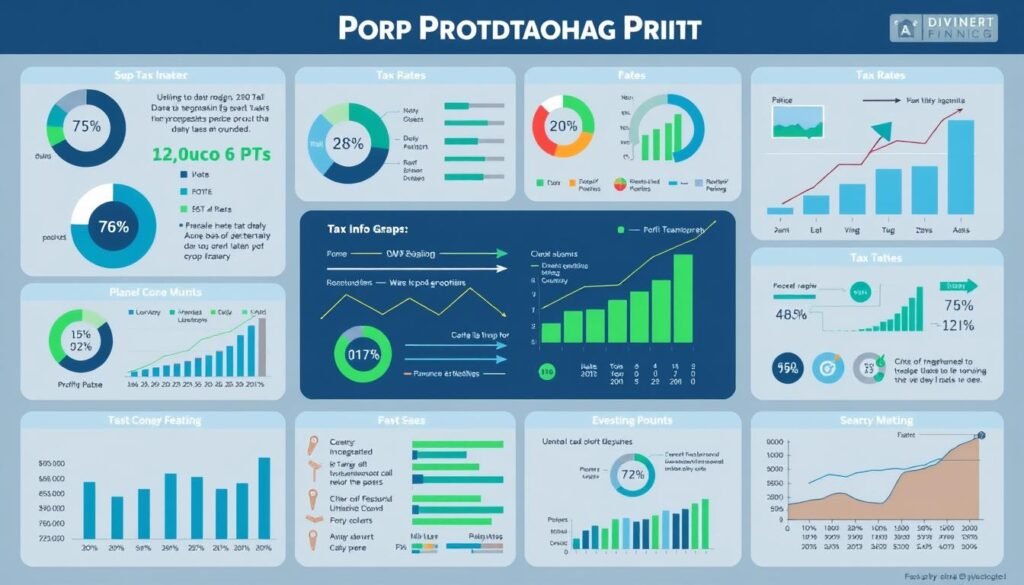When the day ends and profits ring in at a proprietary trading firm, many wonder: “What’s the catch?” Here’s a truth that challenges common beliefs—do you actually pay taxes on those prop trading earnings, or can you reinvest with a clean slate? Exploring this, we find a complex web of prop trading tax rules and tax treatment of prop trading earnings.
Grasping these financial rules could make a huge difference. It could turn a great year-end statement into a nightmare with the IRS. Let’s explore the financial maze together, uncovering the secrets of a prop trader’s taxes.
Key Takeaways
- Identifying the tax liabilities tied to prop trading profits.
- Comprehending how the prop trading tax rules apply to individual trades and overall earnings.
- A brief introduction to the complexities surrounding the tax treatment of prop trading earnings.
- Insights into how to stay compliant with tax regulations as a proprietary trader.
- Preview of the deeper discussion on tax strategies and benefits for prop traders.
Understanding Prop Trading and Its Taxation Landscape
Proprietary trading, or prop trading, is when financial firms or banks trade for their own gain. They don’t earn money by trading for clients. This way of trading changes how prop trading taxes are handled because of the unique income it brings in.
Prop trading firms tax obligations are different from regular investment places. This is because the money made from prop trading is seen as direct business income. It’s key for companies and people involved to know the tax rules well in this area.
Let’s look at how prop trading firms deal with taxes:
- First, they figure out if the income is capital gains or regular income. This decides the tax rate.
- They must follow strict IRS rules and report everything accurately. This is more strict than for regular investments.
- It’s important to know how to use trading losses. This can help reduce taxable income through smart accounting.
The table below compares tax handling between prop trading firms and regular investment firms:
| Aspect | Prop Trading Firms | Traditional Investment Firms |
|---|---|---|
| Tax Rate | Business Income Rate | Capital Gains Rate |
| IRS Compliance | High | Moderate |
| Loss Utilization | Can offset other income | Limited by capital loss rules |
The specific prop trading taxes and rules show why prop trading firms need special financial plans. Knowing these rules well helps traders manage their taxes better and improve their finances.
U.S. Tax Regulations for Proprietary Trading Firms
Proprietary trading firms in the U.S. have their own set of tax rules. These rules are different from those for individual traders. It’s key to know these rules to follow the law and make the most of tax strategies.
The Basics of Prop Trading Taxes
When a trade is closed or inventory is valued at year-end, taxes are applied. This rule affects when and how much tax a firm owes. Gains are taxed right away, but losses can be used to reduce future taxes. This helps firms manage their finances better.
Filing Requirements for Prop Traders
The IRS has specific rules for prop trading firms. They must report their trading and financial details every year. Keeping good records and filing on time helps avoid fines and ensures taxes are reported correctly.
| Event | Reporting Requirement | Deadline |
|---|---|---|
| Annual tax return | Complete financial disclosure including profit or loss | April 15 |
| Quarterly estimated tax payments | Estimated income tax payment based on projected yearly profit | April 15, June 15, September 15, January 15 |
| Mark-to-market elections | File Form 3115 for election or revocation | April 15 |
For prop trading firms, understanding tax planning is crucial. By following the U.S. tax laws closely, firms can improve their finances and reduce legal risks.
Prop Firms and Taxation: Do You Pay Taxes on Profits?
Many ask, do you pay taxes on profits? Yes, profits from prop trading are taxed. The tax amount depends on how the IRS classifies the profits. It’s key for traders to know these classifications to handle their taxes well.
Prop trading firms face complex tax rules. They make money from trading securities, commodities, and currencies. Each type of trade has its own tax rules, based on the firm’s structure and the laws.
| Type of Profit | Classification | Taxation Rate |
|---|---|---|
| Securities Trading | Short-term Capital Gains | Up to 37% |
| Commodities Trading | Section 1256 Contracts | 60% Long-term (15-20%), 40% Short-term (up to 37%) |
| Currency Trading | Ordinary Income | Up to 37% |
Some prop firms might not pay taxes on profits in certain areas. This is due to tax breaks or special financial laws. Firms need to follow these rules closely with the help of lawyers to stay within the law and save on taxes.
Also, do you pay taxes on profits includes deductions that can lower your tax bill. Knowing all about tax liability is crucial for prop traders. Getting advice from a tax expert who knows the trading world is a good idea.
Distinguishing Between Trader and Investor Tax Status
It’s key to know the difference between traders and investors, especially when it comes to tax implications for prop traders and prop trading tax benefits. The IRS has rules to decide who is a trader and who is not. This can change how much taxes you pay and how you file your taxes.
What Defines a Trader for Tax Purposes?
A trader, for the IRS, is someone who trades often and with the goal of making money from quick market changes. Unlike investors, traders can deduct business-related costs. This is because traders are seen as running a business, not just investing.
The Tax Benefits of Trader Status
Being called a trader comes with tax perks. One big one is the chance to report gains or losses at the end of the year. This can lower your taxable income. Also, traders can write off costs like equipment and subscriptions from their income.
In short, being a trader or investor affects your taxes a lot. It decides if you can use prop trading tax benefits. So, it’s vital to follow IRS rules and keep good records.
How Prop Trading Profits are Taxed: An Overview
Understanding prop trading profits tax is key to smart financial planning. The tax on trading profits depends on if it’s short-term or long-term capital gains. It also depends on the tax brackets and rates.
Prop trading profits face complex prop trading tax rules. These rules change based on the trading firm’s structure and the type of income. The financial instruments traded and how long they were held also affect the tax rates.
- Short-term capital gains are taxed like regular income.
- Long-term capital gains have lower tax rates, depending on holding time.

| Tax Type | Rate | Assets Held Duration |
|---|---|---|
| Short-term Capital Gains | 10% – 37% | Less than 1 Year |
| Long-term Capital Gains | 0% – 20% | More than 1 Year |
Working with tax experts is wise for traders and firms. They know the trading tax laws well. This partnership can lead to better tax planning and lower tax bills.
Knowing about prop trading profits tax helps traders make better choices. They can plan their trades and strategies to increase their profits.
Tax Deductions and Benefits for Prop Traders
Proprietary traders in the United States get big tax breaks. These help lower their taxable income. This section talks about the common expenses traders can deduct. It also explains how mark-to-market accounting is key in prop trading.
Common Deductible Expenses
Prop trading tax deductions cover many daily costs. These include office supplies, computers, and trading software. Also, educational materials to improve trading skills are deductible.
Home office expenses are a big deduction. If a part of your home is only for trading, you can deduct a portion of rent, utilities, and insurance. This setup helps with taxes and makes a good trading space.
Understanding Mark-to-Market Accounting
Mark-to-market accounting is crucial for prop traders. It means treating all positions as sold at year-end. This way, profits and losses are reported easily.
This method also changes how taxes are handled. It can make a big difference in your tax bill.
| Expense Category | Examples | Eligibility for Deduction |
|---|---|---|
| Office Supplies | Pens, paper, printers | Yes |
| Technology | Computers, Monitors | Yes |
| Software | Trading platforms, Charting tools | Yes |
| Education | Trading courses, Books | Yes |
| Home Office | Rent, Utilities, Insurance | Only if exclusively used for trading |
Avoiding Common Tax Mistakes Made by Prop Traders
Proprietary trading can bring big financial rewards. But, it’s key to understand prop trading tax compliance to keep those gains. Knowing common tax pitfalls for traders helps avoid fines and keeps your finances stable.
Misreporting income and wrong deductions are big mistakes. They can lead to serious trouble. To dodge these, prop traders should keep detailed records and check their tax plans with experts often.
- Always report all trading income accurately to avoid any discrepancies that could invite scrutiny.
- Ensure that all deductions are legitimate trading business expenses. Improper deductions can lead to audits and penalties.
- Maintain a clear distinction between trading and personal finances to streamline prop trading tax compliance.
Using strong accounting systems helps make your financial reports more accurate. This protects your investments from common tax pitfalls for traders. Working with a tax advisor who knows trading taxes is a good idea.
Don’t just sit back and ignore your tax duties. Keep up with tax laws and update your tax plans regularly. This way, you’ll stay compliant and get the best financial results.
Prop Trading Tax Obligations: Quarterly Estimates and Year-End Reporting
Managing your finances well and following tax rules are key for proprietary traders. This part talks about prop trading quarterly tax payments and prop traders year-end tax reporting. It aims to help you understand and meet these tax needs.
Estimated Tax Payments for Prop Traders
Prop trading quarterly tax payments are a must for good tax management. Since prop traders’ incomes can change a lot, making accurate estimates is very important. It helps avoid penalties and keeps your finances stable all year.
Annual Tax Return Considerations
When the financial year ends, prop traders year-end tax reporting is crucial. You need to gather all your trading data, deductions, and financial actions. Make sure your records are complete and follow tax laws to avoid trouble.
The Impact of Trader Tax Status on Prop Firm Profits
Knowing the tax implications for prop traders is key to figuring out how profitable trading firms can be. The trader tax status greatly affects how much tax traders pay and what tax breaks they get. This status can mean big tax savings but also makes filing taxes more complicated.
| Aspect | Investor Status | Trader Tax Status |
|---|---|---|
| Tax Rate | Higher long-term capital gains tax | Lower short-term capital gains tax applicable |
| Deductions Allowed | Limited to investment expenses | Broader scope, including business expenses |
| Filing Requirements | Standard investor filing | Requirement to file Schedule C, Profit or Loss From Business |
| Market-to-Market Accounting | Not available | Available, enabling current year loss deduction |
Being classified as a trader under the trader tax status has many benefits. Traders can deduct all costs related to trading, like tech expenses and home office space. This can greatly lower the amount of taxes owed, making trading more profitable.
Firms need to check if they qualify for trader tax status to get these benefits. This status not only helps with immediate profits but also shapes long-term financial plans.
Getting and keeping trader tax status can give trading firms a big advantage. It helps them pay less in taxes and make more money. But, it requires careful planning, keeping detailed records of trades, and sometimes help from a tax expert to deal with trader tax rules.
Prop Trading Income Tax: How to Report Trading Income
It’s key for traders to grasp the reporting prop trading income process. This guide will help, covering both federal and state rules.
Navigating Tax Forms for Prop Trading Profits
Traders need to fill out tax forms carefully to report their income right. The main form is the IRS Schedule D, which shows capital gains and losses. Form 8949 is used for sales and other capital asset dispositions.

Getting help from a tax pro or using good software is wise. It helps ensure all info is correct and you get the right deductions. This is crucial for handling federal and state prop trading taxes.
State vs. Federal Taxation for Prop Traders
Federal taxes are the same everywhere, but state taxes differ a lot. For example, Texas and Florida don’t tax income. This can greatly impact a trader’s earnings.
It’s important to know how different states tax. Use detailed tax prep resources or ask proprietary trading firms for advice. They often know the specific rules for each state.
Good tax reporting for prop trading means knowing federal rules and state specifics. Not doing this right can cause big money problems.
In short, all traders should learn how to manage and report their income well. This ensures they follow the rules and get the best financial results in the competitive world of proprietary trading.
Maximizing the Tax Efficiency of Proprietary Trading
Effective tax strategies for prop traders are key to making more money by paying less in taxes. This focus on tax-efficient trading can greatly improve the profits of both individual traders and their firms.
By mixing advanced strategy planning with financial structuring, traders can improve their tax situation. Here are some basic strategies that help create a tax-efficient trading environment:
- Utilizing Losses to Offset Gains: Prop traders can use losses to balance out gains, which helps with taxes.
- Choosing the Correct Account Type: Different accounts like traditional or Roth IRAs offer tax benefits that can boost a trader’s income.
- Mark-to-Market Accounting: This method lets traders treat gains and losses as regular income. It avoids capital gains tax and allows for trading losses to offset other income.
It’s also important to keep learning and follow tax law changes. Traders need to know about new laws that could affect their trading.
To get the most out of tax-efficient trading, consider how often and how much you trade. This can change your tax status and open up more benefits. Getting advice from a tax expert who knows tax strategies for prop traders is a good idea.
The secret to better tax efficiency in proprietary trading is careful planning and smart financial moves. With proactive tax planning and a good grasp of tax laws, traders can increase their earnings and lower their tax bills.
International Prop Traders: Understanding US Tax Compliance
International prop traders face unique challenges in US tax laws. They must understand international prop trading tax compliance, follow tax treaties, and know the FATCA implications. These are key to success in the US markets.
The Effects of Tax Treaties on Prop Trading
Tax treaties between the US and other countries help avoid double taxation. They are crucial for overseas traders doing business in the US. Using tax treaties wisely can help manage taxes better.
Foreign Account Tax Compliance Act (FATCA) for Prop Traders
FATCA is vital for international prop trading tax compliance. Enacted in 2010, it requires foreign banks and entities to report on US assets. This affects disclosure, withholding, and tax strategies for traders in the US.
| Country | Tax Treaty Benefit | FATCA Requirement |
|---|---|---|
| United Kingdom | Reduced withholding taxes on dividends | Annual FATCA reporting required |
| Canada | No double taxation on interest and royalties | Compliance with local laws and FATCA |
| Japan | Exemption from withholding tax on certain gains | Implementation of reciprocal FATCA agreements |
IRS Audits and Prop Trading: Red Flags and Preparation
Proprietary trading is a big part of the financial world. Firms trade with their own money, not for clients. But, dealing with the IRS can be tricky for prop traders. IRS audits for prop traders are especially challenging because of their unique setup.
One big IRS red flag is when traders are not correctly classified. They need to meet certain activity levels to get tax benefits. Other flags include big write-offs, uneven losses, and income that doesn’t match their lifestyle.
Understanding and preparing for potential IRS audits is crucial for prop traders to ensure financial transparency and tax compliance.
Here are some steps to help prop traders get ready for IRS audits:
- Keep detailed records of all trading and expenses.
- Use accounting methods that the IRS approves.
- Get advice from tax experts to keep up with tax laws.
- Think about telling the IRS about any mistakes before they audit you.
Learning more about taxes in prop trading and IRS rules is also smart. Traders should look for guides that focus on prop trading’s special needs.
In short, while IRS audits for prop traders are scary, being ready is the best defense. Knowing the IRS red flags and taking steps to avoid them can help traders. This way, they can handle audits better if they happen.
Legal Entities for Prop Trading: Choosing the Best Structure for Tax Purposes
Choosing the right legal entity is key for prop trading firms to save on taxes. Knowing how LLCs, Corporations, and Partnerships are taxed can greatly impact a firm’s finances. This section will explore how these entities are taxed and help pick the most tax-efficient structure for prop trading.
Differences in Taxation for LLCs, Corporations, and Partnerships
Each legal entity, like LLCs, Corporations, and Partnerships, has its own tax rules. LLC vs. Corporation vs. Partnership taxation is crucial for planning and managing risks in trading.
| Entity Type | Taxation Model | Key Benefits |
|---|---|---|
| LLC (Limited Liability Company) | Pass-through taxation | Flexibility, Fewer compliance requirements |
| Corporation (C-Corp) | Double taxation (corporate level and dividend distribution) | Limited liability, Ability to raise capital |
| Partnership | Pass-through taxation | Simple setup, Profit/loss flows directly to partners |
Considerations for Setting Up a Prop Trading Entity
When starting a prop trading firm, several key factors must be considered. These include tax liabilities, asset protection, and business growth potential. Choosing the right entity affects tax filings and the business’s financial health.
It’s vital for firms to talk to tax experts to make smart choices. Whether choosing an LLC, Corporation, or Partnership, the goal is to match the business structure with its tax and operational goals.
Prop Trading Profits Tax: Strategies for Deferment and Reduction
In the world of proprietary trading, managing taxes well is key. This includes prop trading profits tax deferment and tax reduction strategies. These methods help traders save money on taxes and improve their financial health.
Using retirement accounts is a smart move for prop traders. These accounts are great for saving for the future and lowering taxes. When you withdraw the money, you might pay less in taxes, especially in retirement.
- Utilizing retirement accounts to defer income and lower tax brackets upon withdrawal
- Exploring tax-loss harvesting to offset capital gains with any realized losses
- Investment in tax-exempt securities like municipal bonds
- Optimization of trading structure and operations to leverage tax benefits
Also, how you set up your trading business can save you a lot on taxes. Picking the right business type, like an LLC or S-Corporation, can change how much you pay in taxes.
| Strategy | Description | Impact on Prop Trading Profits Tax |
|---|---|---|
| Retirement Accounts | Defer taxes through contributions to retirement vehicles like 401(k) plans or IRAs. | Defers taxes until withdrawal, potentially at a lower rate. |
| Tax-Loss Harvesting | Offset capital gains through the sale of other securities at a loss. | Reduces taxable income by offsetting gains with losses. |
| Municipal Bonds | Invest in securities that offer tax-exempt interest income. | Avoids federal, and often state and local, taxes on interest received. |
| Business Structure Optimization | Choose an appropriate business entity that provides beneficial tax treatment. | Can significantly reduce taxable income and overall tax liability. |
To use these tax strategies well, you need to know a lot about taxes and your financial goals. It’s wise to talk to financial experts. They can help you make these strategies work for you, making sure you follow the rules and get the most out of your trading.
Tax Treatment of Prop Trading Earnings: Short-Term vs. Long-Term Gains
Short-term and long-term capital gains have different tax treatments in prop trading. Short-term gains, from assets sold in less than a year, are taxed at income tax rates. These rates can be up to 37%, depending on your tax bracket. On the other hand, long-term gains, from assets sold after a year, have lower tax rates. These rates usually don’t go over 20%.
Understanding these tax differences is key for traders wanting to lower their tax bills. They need to track how long they hold their investments. This helps them make smart selling choices, aiming for lower tax rates.
For example, holding a profitable trade for over a year can save a lot on taxes. Traders should plan their trades with tax savings in mind. This way, they can keep more of their earnings after taxes.
Effective tax management in prop trading goes beyond just making good trades. It also means knowing the tax laws well. By timing their trades right, traders can reduce their tax burden. It’s important to work with a tax expert to make sure you’re following all tax rules.
FAQ
What are the general tax obligations for prop trading firms?
Are profits from prop trading subject to taxation?
How does the IRS differentiate between a trader and an investor?
What are some common deductible expenses for prop traders?
What are the tax implications for prop traders when using mark-to-market accounting?
What are some common tax mistakes made by prop traders?
What estimated tax payments are required for prop traders?
FAQ
What are the general tax obligations for prop trading firms?
Prop trading firms must pay income taxes on their earnings. They also need to follow IRS tax filing rules. Plus, they must stick to specific tax rules for trading.
Are profits from prop trading subject to taxation?
Yes, profits from proprietary trading are taxed. The tax type and amount depend on the firm’s structure and trading duration. It also depends on whether the trader is seen as a “trader” or “investor” for tax purposes.
How does the IRS differentiate between a trader and an investor?
The IRS looks at several things to tell traders from investors. They check how often trades are made and if trading is a main income source. They also look at how much time is spent trading.
What are some common deductible expenses for prop traders?
Prop traders can deduct many expenses. These include trading software, home office costs, professional fees, and educational materials. They can also deduct other costs directly tied to trading.
What are the tax implications for prop traders when using mark-to-market accounting?
Mark-to-market accounting can change when and how much you pay in taxes. It lets traders recognize all gains and losses by the end of the tax year. This can greatly affect how much you owe in taxes.
What are some common tax mistakes made by prop traders?
Many prop traders make tax mistakes. These include not reporting income correctly, not keeping good records of trades, claiming wrong deductions, and not filing or paying taxes on time.
What estimated tax payments are required for prop traders?
Prop traders who owe
FAQ
What are the general tax obligations for prop trading firms?
Prop trading firms must pay income taxes on their earnings. They also need to follow IRS tax filing rules. Plus, they must stick to specific tax rules for trading.
Are profits from prop trading subject to taxation?
Yes, profits from proprietary trading are taxed. The tax type and amount depend on the firm’s structure and trading duration. It also depends on whether the trader is seen as a “trader” or “investor” for tax purposes.
How does the IRS differentiate between a trader and an investor?
The IRS looks at several things to tell traders from investors. They check how often trades are made and if trading is a main income source. They also look at how much time is spent trading.
What are some common deductible expenses for prop traders?
Prop traders can deduct many expenses. These include trading software, home office costs, professional fees, and educational materials. They can also deduct other costs directly tied to trading.
What are the tax implications for prop traders when using mark-to-market accounting?
Mark-to-market accounting can change when and how much you pay in taxes. It lets traders recognize all gains and losses by the end of the tax year. This can greatly affect how much you owe in taxes.
What are some common tax mistakes made by prop traders?
Many prop traders make tax mistakes. These include not reporting income correctly, not keeping good records of trades, claiming wrong deductions, and not filing or paying taxes on time.
What estimated tax payments are required for prop traders?
Prop traders who owe $1,000 or more in taxes should make quarterly payments. This is to avoid penalties for not paying enough taxes.
How can a trader’s tax status affect a prop firm’s profits?
A trader’s tax status can greatly impact a prop firm’s profits. It affects how trading losses are treated, what expenses can be deducted, and the tax rates on gains. Gains are taxed differently based on whether they are short-term or long-term.
How should prop traders report trading income for tax purposes?
Prop traders should report their trading income on their tax return. They use IRS Form 1040 and Form 8949 for capital gains and losses. They also report overall gains and losses on Schedule D.
What strategies can prop traders use to maximize tax efficiency?
Prop traders can use several strategies to save on taxes. They can use retirement accounts to delay taxes, hold onto investments for favorable capital gains rates, and choose the right business structure to lower taxes.
What are the US tax compliance requirements for international prop traders?
International prop traders must follow US tax laws. They must report all taxable income to the IRS. They also need to understand tax treaties and follow FATCA regulations.
How do IRS audits affect prop traders?
Prop traders might face IRS audits. These audits check if trading income is reported correctly, if deductions are valid, and if tax laws are followed. Keeping good records and being transparent in reporting is key to dealing with audits.
What are the differences in taxation for LLCs, corporations, and partnerships in prop trading?
LLCs, corporations, and partnerships have different tax rules. LLCs often have pass-through taxation. Corporations face corporate taxes and double taxation on dividends. Partnerships report income through individual partners’ tax returns.
What are some strategies for deferment or reduction of prop trading profits tax?
Prop traders can delay taxes by using retirement plans. They can also reduce taxes by using losses to offset gains, choosing long-term capital gains rates, and structuring trades for tax benefits.
How does the tax treatment differ for short-term versus long-term prop trading earnings?
Short-term capital gains are taxed as regular income. Long-term capital gains have lower tax rates. These rates are generally lower than regular income tax rates.
,000 or more in taxes should make quarterly payments. This is to avoid penalties for not paying enough taxes.
How can a trader’s tax status affect a prop firm’s profits?
A trader’s tax status can greatly impact a prop firm’s profits. It affects how trading losses are treated, what expenses can be deducted, and the tax rates on gains. Gains are taxed differently based on whether they are short-term or long-term.
How should prop traders report trading income for tax purposes?
Prop traders should report their trading income on their tax return. They use IRS Form 1040 and Form 8949 for capital gains and losses. They also report overall gains and losses on Schedule D.
What strategies can prop traders use to maximize tax efficiency?
Prop traders can use several strategies to save on taxes. They can use retirement accounts to delay taxes, hold onto investments for favorable capital gains rates, and choose the right business structure to lower taxes.
What are the US tax compliance requirements for international prop traders?
International prop traders must follow US tax laws. They must report all taxable income to the IRS. They also need to understand tax treaties and follow FATCA regulations.
How do IRS audits affect prop traders?
Prop traders might face IRS audits. These audits check if trading income is reported correctly, if deductions are valid, and if tax laws are followed. Keeping good records and being transparent in reporting is key to dealing with audits.
What are the differences in taxation for LLCs, corporations, and partnerships in prop trading?
LLCs, corporations, and partnerships have different tax rules. LLCs often have pass-through taxation. Corporations face corporate taxes and double taxation on dividends. Partnerships report income through individual partners’ tax returns.
What are some strategies for deferment or reduction of prop trading profits tax?
Prop traders can delay taxes by using retirement plans. They can also reduce taxes by using losses to offset gains, choosing long-term capital gains rates, and structuring trades for tax benefits.
How does the tax treatment differ for short-term versus long-term prop trading earnings?
Short-term capital gains are taxed as regular income. Long-term capital gains have lower tax rates. These rates are generally lower than regular income tax rates.









